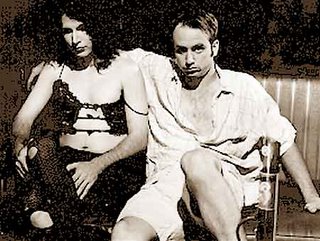 Surrender Dorothy (1998)
Surrender Dorothy (1998)Director: Kevin DiNovis
Androgyny and sexual perversion have been staples of pop culture for some time, but they hit a new peak in the '90s. The polarization of the sexes that erupted in the '60s and '70s became a long cultural hangover during which successful coupling became akin to climbing Mt. Everest in many young minds, and an already lengthy adolescence in America was prolonged even further. We saw this phenomenon play out in films such as Slacker, Clerks, Singles, Two Girls and a Guy, and the one that started it all, Steven Soderbergh's sex, lies, and videotape. A latecomer to this landscape of sexual crisis is Kevin DiNovis' underground film Surrender Dorothy, and in many ways, it has taken the most extreme position of any film I have seen on the subject. At its core are two severely dysfunctional men, one whose fear of women has taken on a long and sharp sadomasochistic edge, the other, a pretty-looking junkie who is, by definition, a liar and a thief.
The film opens showing the midsection of a belly dancer in a restaurant. The film is in black and white, high in contrast, and we are somewhat blinded by this glaring colorlessness as the camera takes a turn around the room. Will this film be about some Turkish mogul, a restauranteur, the belly dancer? A flash of the white shirt of a busboy distracts us, then the camera slowly does a 360 around this man. Yes, the film is about him. His name is Trevor (Peter Pryor), and we watch him fix his gaze on a fork and imagine the fork going into the mouth of a woman. We watch him at the end of the night being spoken to dismissively by his boss (the film's producer Richard Goldberg) and dominated by the head waitress, who refuses to give him a fair share of tips. Later, we see him at home in a warehouse loft, masturbating into his toilet while raking his mouth with the fork. This is the type of sex he is used to having because he is terrified of women.
Enter Lahn, a junkie who is on the run from his dealer because he stole the dealer's entire stash. He holes up with Trevor in the loft, which is subdivided using chain-link fencing and sheets of plastic. Privacy is only a state of mind for these two young men. They witness each other whacking off and shooting smack. A boundary is crossed, and Trevor, no longer alone, is craving real human contact. He begins to crave it with Lahn. When Lahn's stash runs out, Trevor agrees to hook him up if Lahn will do something for him. Trevor pulls out an apron he found in the restaurant and throws it at Lahn. "Wear this and clean up this place", says the fastidious Trevor. Lahn dons the apron, which is emblazoned with the name "Dorothy" and starts scrubbing. So begins Trevor and Lahn's strange adventure in which both men, neither of whom is gay, become more and more closely invested in having a man/woman relationship.
Peter Pryor's Trevor is one of the nastiest characters I have ever seen on screen. He's thoroughly creepy, angry, scary. I'd cross the street to get out of his way. Heck, I'd move out of town! DiNovis' Lahn is common and rather stupid. He doesn't even see how far he has gone until it is too late; of course, he's stoned on smack much of the time, so that certainly clouds whatever judgment he might have had to begin with. Lahn and Trevor are given a couple of speeches that give clues to the origins of their psychologies and why it has led them into this twisted psychodrama. The speeches are a bit heavyhanded, but provide some satisfaction as to why things play out as they do.
Ultimately, it is the relationship between Lahn and Trevor that is as compelling to watch as a house on fire. I literally couldn't tear myself away from this movie. It's a low-budget affair that seems to draw realistically from a life I've never known. DiNovis said the film was conceived as a comedy, and I think 20-somethings will get the joke. I didn't. It just was a sexy, compelling portrait of deviance from a promising young talent. Luis Bunuel would have been proud of Mr. DiNovis. l


0 Comments:
Post a Comment
<< Home